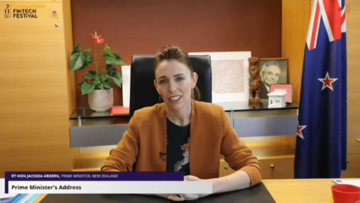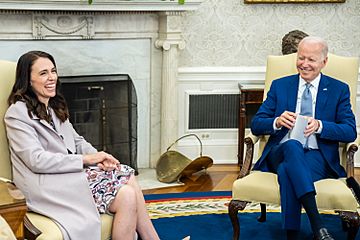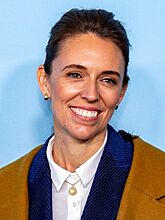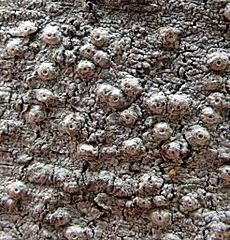Jacinda Ardern facts for kids
Quick facts for kids
Dame Jacinda Ardern
GNZM
|
|
|---|---|
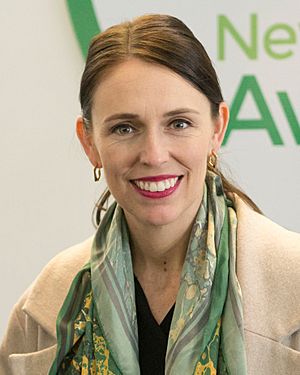
Ardern in 2018
|
|
| 40th Prime Minister of New Zealand | |
| In office 26 October 2017 – 25 January 2023 |
|
| Monarch | |
| Governor-General | |
| Deputy | |
| Preceded by | Bill English |
| Succeeded by | Chris Hipkins |
| 17th Leader of the Labour Party | |
| In office 1 August 2017 – 22 January 2023 |
|
| Deputy | Kelvin Davis |
| Preceded by | Andrew Little |
| Succeeded by | Chris Hipkins |
| 36th Leader of the Opposition | |
| In office 1 August 2017 – 26 October 2017 |
|
| Deputy | Kelvin Davis |
| Preceded by | Andrew Little |
| Succeeded by | Bill English |
| 17th Deputy Leader of the Labour Party | |
| In office 7 March 2017 – 1 August 2017 |
|
| Leader | Andrew Little |
| Preceded by | Annette King |
| Succeeded by | Kelvin Davis |
| Member of the New Zealand Parliament for Mount Albert |
|
| In office 8 March 2017 – 15 April 2023 |
|
| Preceded by | David Shearer |
| Succeeded by | Helen White |
| Majority | 21,246 |
| Member of the New Zealand Parliament for the Labour party list |
|
| In office 8 November 2008 – 8 March 2017 |
|
| Succeeded by | Raymond Huo |
| Personal details | |
| Born |
Jacinda Kate Laurell Ardern
26 July 1980 Hamilton, New Zealand |
| Political party | Labour |
| Spouse |
Clarke Gayford
(m. 2024) |
| Children | 1 |
| Parent |
|
| Alma mater | University of Waikato (BCS) |
Dame Jacinda Ardern (born 26 July 1980) is a New Zealand politician. She was the 40th Prime Minister of New Zealand and the leader of the Labour Party from 2017 to 2023. She was also a Member of Parliament (MP) for Mount Albert from 2017 to 2023. Before that, she was a list MP from 2008 to 2017.
Jacinda Ardern grew up in New Zealand and joined the Labour Party when she was 17. After university, she worked for former New Zealand Prime Minister Helen Clark. She also worked in London for the UK government. In 2008, she became the president of the International Union of Socialist Youth.
Ardern was first elected as an MP in 2008. She became the deputy leader of the Labour Party in March 2017. Just five months later, she became the leader of the Labour Party. Her party's support grew quickly, and she led them to win many seats in the 2017 election. Labour formed a government with another party, and Jacinda Ardern became Prime Minister on 26 October 2017. She was 37 years old, making her one of the youngest female heads of government in the world. In 2018, she had her daughter, becoming the second elected head of government to give birth while in office.
As Prime Minister, Ardern's government focused on issues like child poverty and social inequality. After the Christchurch mosque shootings in 2019, she quickly introduced stricter gun laws. She also led New Zealand's response to the COVID-19 pandemic, which was praised for successfully controlling the virus. In the 2020 election, her party won a large victory, gaining a majority of seats in Parliament.
In January 2023, Ardern announced she would resign as Prime Minister. She said she no longer had enough energy for the demanding role. She officially resigned on 25 January 2023.
Contents
Early Life and Education
Jacinda Kate Laurell Ardern was born on 26 July 1980 in Hamilton, New Zealand. She spent her childhood in Morrinsville and Murupara. Her father, Ross Ardern, was a police officer, and her mother, Laurell Ardern, worked at a school. She has an older sister named Louise.
Ardern joined the Labour Party when she was 17. Her aunt, who was a long-time Labour Party member, encouraged her to help with election campaigns.
She studied at the University of Waikato and graduated in 2001 with a degree in politics and public relations. After university, she worked for New Zealand politicians, including former Prime Minister Helen Clark. She also spent time volunteering in New York City. Later, in 2006, she moved to London, England, and worked as an adviser for the UK government under Prime Minister Tony Blair.
Early Political Career
Leading Youth Socialists
On 30 January 2008, when she was 27, Ardern was chosen as the president of the International Union of Socialist Youth (IUSY). This role meant she traveled to many countries. She held this position for two years, even after she became an MP in New Zealand.
Becoming a Member of Parliament
Before the 2008 election, Ardern was placed high on Labour's party list. This meant she was almost guaranteed a seat in Parliament. She returned from London to campaign. She became a list MP in 2008, meaning she entered Parliament based on her party's overall vote, not by winning a specific local area. When she was elected, she was the youngest MP in Parliament at the time.
The leader of the Labour Party, Phil Goff, gave Ardern important roles. She became the spokesperson for Youth Affairs. She also appeared regularly on TV, discussing politics with other young MPs.
Ardern tried to win a local seat in Auckland Central in the 2011 and 2014 elections but came second both times. However, she continued to be an MP through the party list. After the 2011 election, she was promoted to a higher position in the Labour Party's team, becoming a spokesperson for social development.
In 2014, Ardern was chosen to be part of the World Economic Forum's Forum of Young Global Leaders. She continues to be involved with this group and speaks at their events.
Before Becoming Prime Minister
Mount Albert Election
In February 2017, a special election was held for the Mount Albert area. Ardern was the only person nominated by the Labour Party. She won this election by a large number of votes.
Deputy Leader of the Labour Party
After winning the Mount Albert election, Ardern was chosen as the deputy leader of the Labour Party on 7 March 2017. This happened after the previous deputy leader resigned.
Leader of the Opposition
On 1 August 2017, just seven weeks before the general election, Ardern became the leader of the Labour Party. This also made her the Leader of the Opposition. The previous leader, Andrew Little, stepped down because the party's support was very low in opinion polls. Ardern was chosen as the new leader without anyone else running against her. At 37, she was the youngest leader of the Labour Party ever.
After Ardern became leader, Labour's support in opinion polls grew very quickly. People started donating a lot of money to the party. By late August, Labour's support had jumped significantly, even passing the National Party in some polls.
Ardern promised that a Labour government would look into a new tax on capital gains (profits from selling assets like property), but she later said this would not happen in her first term. Farmers criticized some of Labour's proposed taxes on water and pollution. During a protest, one farmer held a sign that was seen as disrespectful towards Ardern.
2017 General Election
In the general election on 23 September 2017, Ardern kept her Mount Albert seat. Labour increased its share of votes and gained 14 seats in Parliament, their best result since 2008.
Neither Labour nor the National Party had enough seats to govern alone. They had to talk with other parties to form a government. The New Zealand First party decided to form a government with Labour, with support from the Green Party. This meant Jacinda Ardern would become the next Prime Minister.
Prime Minister (2017–2023)
First Term (2017–2020)
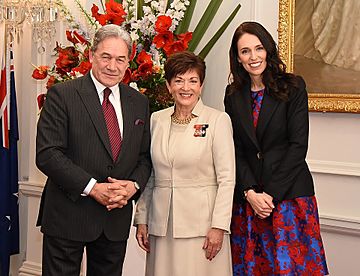
On 19 October 2017, it was announced that Jacinda Ardern would be the next Prime Minister. She was officially sworn in on 26 October. Ardern was New Zealand's third female Prime Minister. She was also the youngest person to become New Zealand's head of government in over 160 years.
In January 2018, Ardern announced she was pregnant. She gave birth to her daughter on 21 June 2018. She took six weeks of maternity leave, and Winston Peters became acting Prime Minister during that time.
What Happened in New Zealand
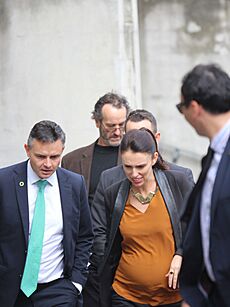
Ardern promised to cut child poverty in half within ten years. Her government introduced the Families Package, which increased paid parental leave and provided payments for families with young children. They also increased welfare benefits and expanded free doctor's visits for some groups.
Economically, her government increased the minimum wage. They also started the Provincial Growth Fund to invest in projects in rural areas. The first year of post-secondary education became free from 2018.
Ardern visited Waitangi in 2018 for the annual Waitangi Day celebration. She stayed for five days, which was longer than usual. Her visit was well-received by Māori leaders.
International Relations
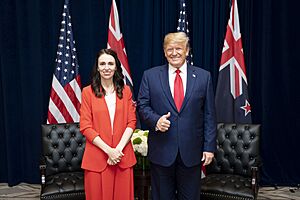
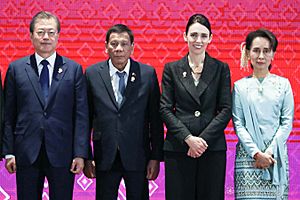
In November 2017, Ardern made her first official overseas trip to Australia. She met with Australian Prime Minister Malcolm Turnbull. They discussed improving relations between the two countries.
Ardern attended several international summits, including the APEC summit in Vietnam and a United Nations summit in New York City. At the UN, she became the first female head of government to attend with her baby. She spoke about the importance of kindness, climate change, and women's equality.
She also raised concerns about human rights issues in China and Myanmar. In 2020, she met with Australian Prime Minister Scott Morrison and discussed Australia's policy of deporting New Zealanders.
Christchurch Mosque Shootings
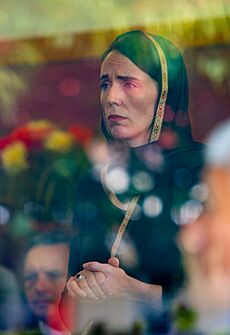
On 15 March 2019, a terrible terrorist attack happened in two mosques in Christchurch, where 51 people were killed. Ardern quickly responded, offering comfort and stating that such extreme views had no place in New Zealand. She announced a period of national mourning and visited Christchurch to meet victims' families. She famously said she would never speak the attacker's name, focusing instead on the victims.
Ardern received praise from around the world for her compassionate response. A photo of her hugging a Muslim community member was even projected onto the Burj Khalifa, the world's tallest building.
In response to the shootings, Ardern's government quickly introduced stronger gun laws. Less than a month after the attack, Parliament passed a law banning most semi-automatic weapons and high-capacity magazines. Ardern also worked with French President Emmanuel Macron to create the Christchurch Call, an effort to stop the use of social media to promote terrorism.
COVID-19 Pandemic Response
On 14 March 2020, Ardern announced strict border rules for New Zealand to stop the spread of COVID-19. On 26 March, a nationwide lockdown was put in place.
Her leadership during the pandemic was widely praised both in New Zealand and internationally. She used interviews and social media to communicate clearly with the public. New Zealand was one of the few Western countries to successfully control the virus early on.
In May 2020, Ardern's popularity reached a very high level in opinion polls. Experts estimated that her government's actions saved many lives.
Second Term (2020–2023)
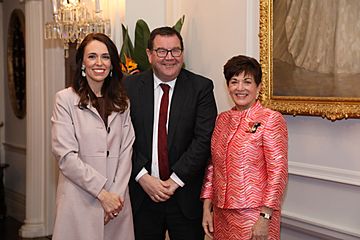
In the 2020 general election, Ardern led her Labour Party to a huge victory. They won a majority of 65 seats in Parliament, which was the first time a single party had done this since 1996. She also kept her Mount Albert seat by a large number of votes. Ardern said her victory was due to her government's successful response to the COVID-19 pandemic.
In 2021, the more infectious Delta variant of COVID-19 spread in New Zealand. A nationwide lockdown was put in place again. By October 2021, New Zealand ended its "Covid zero" strategy, which aimed to eliminate the virus completely.
By late 2022, Ardern's popularity and support for her policies had decreased. Public opinion polls showed lower approval ratings for her and her government.
What Happened in New Zealand
On 2 December 2020, Ardern declared a climate change emergency in New Zealand. She promised that the government would become carbon neutral by 2025. This meant the public sector would buy only electric or hybrid vehicles and stop using coal-fired boilers.
Her government also made changes to address housing affordability. They removed some tax benefits for rental properties and extended the "Bright Line Test" for selling properties.
In June 2021, Ardern announced that the New Zealand Government would formally apologize for the Dawn Raids. These were police raids in the 1970s and 1980s that unfairly targeted people from Pacific Islands.
In September 2022, Ardern led the country's tributes after the death of Queen Elizabeth II. Ardern described the Queen as an "incredible woman." Ardern also said that New Zealand might become a republic in the future, but it was not a priority at that time.
In December 2022, Ardern was heard calling another politician an "arrogant prick" during a parliamentary debate. She later apologized, and they both used the incident to raise money for charity.
COVID-19 and Vaccinations
In June 2020, Ardern had a meeting with Bill Gates and Melinda Gates to discuss a global approach to a COVID-19 vaccine. New Zealand's government had already pledged money to help find a vaccine.
In December 2020, Ardern announced that New Zealand would create travel bubbles with the Cook Islands and Australia in 2021, allowing quarantine-free travel. She also confirmed that New Zealand had bought more vaccines from different companies.
In January 2021, Ardern stated that New Zealand's borders would remain closed to most non-citizens until New Zealanders were vaccinated. The vaccination program began in February 2021.
During the Delta variant outbreak in August 2021, Ardern's government again put the country into a nationwide lockdown.
Ardern's government faced criticism for its border management during the pandemic, especially the Managed Isolation and Quarantine (MIQ) system. This system meant many New Zealanders were stuck overseas for a long time. In April 2022, a court ruled that parts of the MIQ system unfairly limited citizens' right to return home.
International Relations
In December 2020, Ardern supported Australia in a disagreement with China over a social media post. She said the post was not factual.
In February 2021, Ardern criticized Australia's decision to remove the citizenship of a dual New Zealand–Australian national who had traveled to Syria. Ardern said Australia was abandoning its responsibilities.
In May 2021, Ardern hosted Australian Prime Minister Scott Morrison. They discussed cooperation on COVID-19, trade, and security in the Indo-Pacific region. They also raised concerns about human rights in Hong Kong and Xinjiang.
In April 2022, Ardern was banned from entering Russia along with other New Zealand officials. This was in response to New Zealand's sanctions against Russia for its invasion of Ukraine.
In late May 2022, Ardern visited the United States to promote trade and tourism. She met with US President Joe Biden and Vice-president Kamala Harris. They discussed strengthening relations between the two countries and talked about issues like the South China Sea and the war in Ukraine. Ardern also spoke at Harvard University about gun reform and democracy.
In June 2022, Ardern attended the NATO's Leader Summit, which was the first time New Zealand had formally addressed a NATO event. She spoke about New Zealand's commitment to peace and human rights.
In August 2022, Ardern visited Samoa to celebrate 60 years of Samoa's independence. She discussed climate change and economic support with the Samoan Prime Minister.
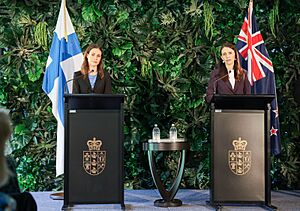
In November 2022, Ardern hosted Finnish Prime Minister Sanna Marin in New Zealand. They discussed trade, the global economy, and the war in Ukraine.
Resignation
On 19 January 2023, Ardern announced that she would resign as Labour leader and Prime Minister by 7 February. She also said she would leave Parliament later in 2023. She explained that she wanted to spend more time with her family and felt she no longer had enough energy to do the job justice.
Her announcement led to many reactions from politicians in New Zealand and around the world. Many thanked her for her service. On 25 January 2023, Chris Hipkins became the new Prime Minister and leader of the Labour Party.
After Being Prime Minister
On 4 April 2023, Ardern was announced as a trustee for the Earthshot Prize. This prize supports solutions for environmental problems. Prince William chose her for this role.
She was also appointed as a Special Envoy for the Christchurch Call, which she helped create to fight online extremist content. In her final speech in Parliament, Ardern asked politicians to work together on climate change.
Ardern accepted fellowships at Harvard Kennedy School starting in late 2023. There, she shares her knowledge of leadership and governance. She also works on studying online extremism.
In June 2024, it was announced that Ardern would lead a program to train new leaders. In August 2024, she supported US Vice President Kamala Harris's presidential campaign.
A documentary about Ardern's time as Prime Minister, called Prime Minister, was released in 2025. Her memoir, titled A Different Kind of Power, was released on 3 June 2025.
In June 2025, Oxford University announced that Ardern would receive an honorary degree. This degree recognizes her achievements without requiring her to study.
Political Beliefs
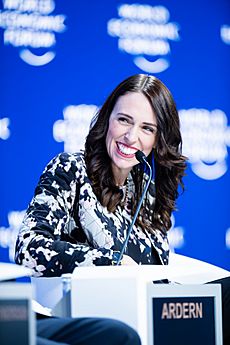
Ardern describes herself as a social democrat and a progressive. She also identifies as a republican (meaning she supports New Zealand becoming a republic) and a feminist. She has said that child poverty and homelessness are major problems in New Zealand.
Ardern supported same-sex marriage and voted for the law that made it legal in 2013. In 2018, she was the first New Zealand Prime Minister to march in a pride parade.
She believes that the decision to keep or remove the Māori electorates (special seats in Parliament for Māori) should be made by Māori people. She also supports making the Māori language a required subject in schools.
Ardern has said that New Zealand should discuss removing the British monarch as its head of state. However, she has also expressed respect for the Royal Family.
In 2017, Ardern suggested lowering the number of people moving to New Zealand. She believed that the country's infrastructure wasn't ready for too much population growth. However, she wanted to increase the number of refugees New Zealand accepted.
In foreign affairs, Ardern supported a two-state solution to the Israeli–Palestinian conflict.
After a court ruling in November 2022, Ardern supported lowering the voting age to 16 years old.
Awards and Recognition
Ardern has received many honors and awards. She was featured on the cover of British Vogue magazine in 2019. Forbes magazine has consistently listed her among the 100 most powerful women in the world. She was also included in the Time 100 list in 2019.
In 2020, she was recognized as one of the greatest thinkers for the COVID-19 era by Prospect magazine. She received Harvard University's 2020 Gleitsman International Activist Award and donated the prize money to New Zealanders studying at the university.
Several species have been named after her, including a flightless wētā (an insect) called Hemiandrus jacinda, a beetle, a lichen, and an ant.
In May 2021, Fortune magazine named Ardern the top leader in the world. They recognized her leadership during the COVID-19 pandemic and her response to the Christchurch mosque shootings.
In May 2022, she received an honorary Doctor of Laws degree from Harvard University for her contributions to the world.
In 2023, Ardern was appointed a Dame Grand Companion of the New Zealand Order of Merit (GNZM) for her service to the country. She received this honor from the Prince of Wales in October 2024.
In November 2024, the United Nations Foundation announced that Ardern would receive the Champion for Global Change Award. This award recognizes her empathetic leadership and her work on women's rights, climate change, and promoting peace.
Personal Life
Family
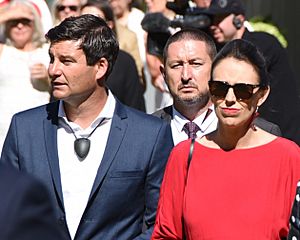
Ardern's husband is television presenter Clarke Gayford. They met in 2012 and got engaged in 2019. Their wedding was planned for January 2022 but was postponed due to the COVID-19 pandemic. They married on 13 January 2024.
On 19 January 2018, Ardern announced she was expecting her first child. She gave birth to her daughter, Neve Te Aroha, on 21 June 2018. Neve is an Irish name meaning 'bright', and Aroha is a Māori word meaning 'love'.
Religious Views
Ardern was raised in The Church of Jesus Christ of Latter-day Saints. However, she left the church in 2005 when she was 25. She said it conflicted with her personal beliefs, especially her support for gay rights. In 2017, Ardern said she was agnostic, meaning she doesn't claim to know if God exists.
See also
 In Spanish: Jacinda Ardern para niños
In Spanish: Jacinda Ardern para niños
 | Toni Morrison |
 | Barack Obama |
 | Martin Luther King Jr. |
 | Ralph Bunche |


